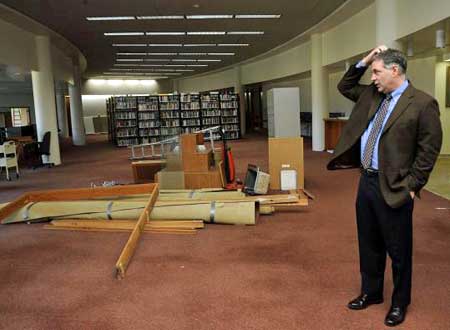September 7, 2009
James Tracy - flaming idiot or visionary
Meet James Tracy, headmaster of Cushing Academy, a New England Prep school.
Say good bye to him as I do not see him being in that position for very long.
From the Boston Globe:

Welcome to the library. Say goodbye to the books.Emphasis mine -- these phrases of yours: "shape emerging trends and optimize technology" James, are you actually trying to get something across here or are these just two of your stack of buzzwords that sound nice but have no meaning, no content... I can see modernizing the library, bringing in a bunch of computers for the students to use, but to toss out your Cushing Academy's Cultural DNA -- to get rid of the 20,000 books that previous students have used for your school's 144 years -- is insanity. Your hubris is bound the bounds of human normalcy. You are not the God of Cushing, you are only its caretaker for a few years. And what sort of facilities will these little snowflakes be able to enjoy:
There are rolling hills and ivy-covered brick buildings. There are small classrooms, high-tech labs, and well-manicured fields. There�s even a clock tower with a massive bell that rings for special events.
Cushing Academy has all the hallmarks of a New England prep school, with one exception.
This year, after having amassed a collection of more than 20,000 books, officials at the pristine campus about 90 minutes west of Boston have decided the 144-year-old school no longer needs a traditional library. The academy�s administrators have decided to discard all their books and have given away half of what stocked their sprawling stacks - the classics, novels, poetry, biographies, tomes on every subject from the humanities to the sciences. The future, they believe, is digital.
�When I look at books, I see an outdated technology, like scrolls before books," said James Tracy, headmaster of Cushing and chief promoter of the bookless campus. �This isn�t �Fahrenheit 451� [the 1953 Ray Bradbury novel in which books are banned]. We�re not discouraging students from reading. We see this as a natural way to shape emerging trends and optimize technology."
Instead of a library, the academy is spending nearly $500,000 to create a �learning center," though that is only one of the names in contention for the new space. In place of the stacks, they are spending $42,000 on three large flat-screen TVs that will project data from the Internet and $20,000 on special laptop-friendly study carrels. Where the reference desk was, they are building a $50,000 coffee shop that will include a $12,000 cappuccino machine.So, you are spending $500K, getting rid of 20,000 books and replacing them with three big-screen tv sets (only three subjects can be studied by a group of students -- none of this reading at your own pace stuff), there are 18 Kindle readers and the Sony equivalent, there are some study carrels for students to bring their own laptops (let's say 20 -- they are only budgeting $20K) So you are going from a theoretical 20,000 separate sources of information down to a maximum of 41. What happens when your 42nd student wants to check out a book? Needless to say, saner heads are speaking out:
And to replace those old pulpy devices that have transmitted information since Johannes Gutenberg invented the printing press in the 1400s, they have spent $10,000 to buy 18 electronic readers made by Amazon.com and Sony. Administrators plan to distribute the readers, which they�re stocking with digital material, to students looking to spend more time with literature.
Those who don�t have access to the electronic readers will be expected to do their research and peruse many assigned texts on their computers.
�Instead of a traditional library with 20,000 books, we�re building a virtual library where students will have access to millions of books," said Tracy, whose office shelves remain lined with books. �We see this as a model for the 21st-century school."
Not everyone on campus is sold on Tracy�s vision.And one last bit:
They worry about an environment where students can no longer browse rows of voluptuous books, replete with glossy photographs, intricate maps, and pages dog-eared by generations of students. They worry students will be less likely to focus on long works when their devices are constantly interrupting them with e-mail and instant messages. They also worry about a world where sweat-stained literature is deemed as perishable as all the glib posts on Facebook or Twitter.
Liz Vezina, a librarian at Cushing for 17 years, said she never imagined working as the director of a library without any books.
�It makes me sad," said Vezina, who hosts a book club on campus dubbed the Off-line Readers and has made a career of introducing students to books. �I�m going to miss them. I love books. I�ve grown up with them, and there�s something lost when they�re virtual. There�s a sensual side to them - the smell, the feel, the physicality of a book is something really special."
William Powers, author of a forthcoming book based on a paper he published at Harvard called �Hamlet�s Blackberry: Why Paper is Eternal," called the changes at Cushing �radical" and �a tremendous loss for students."So Mr. Tracey -- enjoy your fifteen minutes in the spotlight and I hope in the years to come, you come to fully appreciate the wrong you have done to those students in your charge. Needless to say, there are over 400 comments to this at the Boston Globe website... Posted by DaveH at September 7, 2009 12:18 PM
�There are modes of learning and thinking that at the moment are only available from actual books," he said. �There is a kind of deep-dive, meditative reading that�s almost impossible to do on a screen. Without books, students are more likely to do the grazing or quick reading that screens enable, rather than be by themselves with the author�s ideas."
Comments
Post a comment